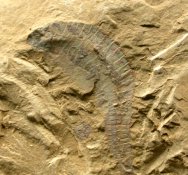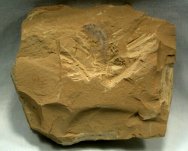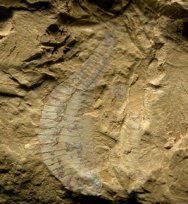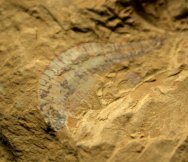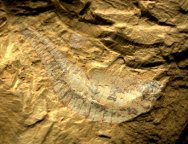Name: Hemichordata; Yannanozoon lividum
Geological Time: Early Cambrian (~525 million years ago)
Size: 23 mm long on a 75 mm by 65 mm matrix
Fossil Site: Chengjiang Maotianshan Hill, Quiongzhusi Section, Yu'anshan Member, Heilinpu FormationYuxi, Chengjiang County, Yunnan Province, China
|
At one point Yunnanozoon was thought to be a member of the Phylum Chordata, but has been reassigned as mentioned above. This one comes from the most famous location of all Chengjiang deposits, Maotianshan (Mao Tian Hill), site of the discovery of the Chengjiang Biota by Hou Xian-guang in 1984. The diversity of soft-tissue fossils is astonishing: algae, medusiforms, sponges, priapulids, annelid-like worms, echinoderms, arthropods (including trilobites), hemichordates, chordates, and the first agnathan fish make up just a small fraction of the total. Numerous problematic forms are known as well, some of which may have represented failed attempts at diversity that did not persist to the present day. As the earliest of the hemichordates, its study casts light upon the early evolution of both the chordates and the vertebrates that sprung from them as the story of life unfolded. The linear structure is the gut, which in some specimens is filled with silt, an indication that it derived sustenance by ingesting the mud of the seafloor. Also see: Chengjiang Biota |
